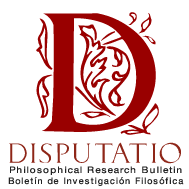David Torrijos Castrillejo
Universidad San Dámaso, Spain | dtorrijos@sandamaso.es
Received: 29-November-2019 | Accepted: 21-November-2019 | Published: 27-December-2019
Disputatio [Dec. 2019], Vol. 8, No. 11, pp. 413–426 | DOI: 10.5281/zenodo.3593996
Article | [SP] | Full Text | Statistics | Copyright Notice [sp] | Vol. 8 No. 11
How to cite this article:
Torrijos Castrillejo, David (2019). «Amistad y filosofía según Aristóteles». Disputatio. Philosophical Research Bulletin 8, no. 11: pp. 413–426.
Abstract | This paper concentrates on friendship as the best context to philosophize. Although Aristotle says that even alone a person could contemplate the truth, it is possible to argue that a philosophical society is indeed necessary for human beings. In every friendship, it is necessary to share certain activities and, at the same time, notice the presence of the friend. In philosophical friendship, the shared activity is philosophy itself and mutual knowledge among friends acquires a peculiar character, because everyone does not only consider the truth with the friend but also he thinks about it as shared with the friend. To teach philosophy represents a kind of unequal friendship, because teachers give to the disciples the great good of knowledge. Further, the paper argues that Aristotelian friendship could not be understood in a narcissistic way, since friends are loved because of their uniqueness and their personal character.
Keywords | Pedagogy · Society · Ethics · Narcissism.
![]()
Aristotle on Friendship and Philosophy
Abstract | El artículo se pregunta si la amistad constituye el mejor contexto en que filosofar. Pese a que Aristóteles dice que incluso en soledad es posible contemplar la verdad, cabe argumentar, fundándose en sus textos, que la compañía es realmente necesaria para que los seres humanos se entreguen a la vida filosófica. En toda amistad es preciso compartir ciertas actividades y, mientras se practican éstas, notar la presencia del amigo. En la amistad filosófica, la actividad compartida es el filosofar y el mutuo conocimiento de los amigos cobra así un peculiar carácter, pues no se trata sólo de considerar la verdad sino de pensar en ella como compartida con el amigo. La enseñanza de la filosofía supone un tipo de amistad entre desiguales, pues los maestros proporcionan a los discípulos un bien de incomparable valía. Por fin, en ningún caso puede entenderse la amistad en Aristóteles de un modo narcisista, puesto que consiste en la apertura a los amigos en su singularidad y por motivo de su carácter personal.
Parole chiave | Pedagogía · Sociedad · Ética · Narcisismo.
References
Aristóteles (1985). Ética nicomáquea; Ética eudemia, traducido por J. Pallí Bonet. Madrid: Gredos.
Aristóteles (1999). Ética a Nicómaco, traducido por M. Araujo y J. Marías. Madrid: Centro de estudios políticos y constitucionales.
Aristóteles (2005). Política, traducido por P. López Barja de Quiroga y E. García Fernández. Madrid: Istmo.
Berti, Enrico (2005). «“Per i viventi l’essere è il vivere” (Aristotele, De anima 415 b 13)». En Fisica, antropologia e metafisica, vol. 2, Nuovi studi aristotelici, editado por E. Berti. Brescia: Morcelliana, pp. 133-141.
Berti, Enrico (2008). «Amitié et philosophie chez Aristote». En Filosofia pratica, vol. 3, Nuovi studi aristotelici, editado por E. Berti. Brescia: Morcelliana, pp. 129-139.
Berti, Enrico (2008). «Il concetto di amicizia in Aristotele». En Filosofia pratica, vol. 3, Nuovi studi aristotelici, editado por E. Berti. Brescia: Morcelliana, pp. 101-111.
Berti, Enrico (2008). «Le emozioni dell’amicizia e la filosofia». En Filosofia pratica, vol. 3, Nuovi studi aristotelici, editado por E. Berti. Brescia: Morcelliana, pp. 141-155.
Defourny, Pierre (1977). «Contemplation in Aristotle’s Ethics». En Articles on Aristotle, editado por J. Barnes, M. Schofield y R. Sorabji, vol. 2. London: Duckworth, pp. 104-112.
Kenny, Anthony (1977). «Aristotle on Happiness». En Articles on Aristotle, editado por J. Barnes, M. Schofield y R. Sorabji, vol. 2. London: Duckworth, pp. 25-32.
Marten, Rainer (1977). «„Esoterik und Exoterik“ oder „Die philosophische Bestimmung wahrheitsfähiger Öffentlichkeit“, demonstriert an Platon und Aristoteles». En Esoterik und Exoterik der Philosophie: Beiträge zu Geschichte und Sinn philosophischer Selbstbestimmung; Rudolf W. Meyer zum 60. Geburtstag, editado por H. Holzhey. Basel: Schwabe, pp. 13-31.
Miller, Patrick Lee (2014). «Finding Oneself with Friends». En The Cambridge Companion to Aristotle’s Nicomachean Ethics, editado por R. Polansky. New York: Cambridge UP, pp. 319-349. doi: 10.1017/CCO9781139022484.015.
Natali, Carlo (2015). Aristotele. Roma: Carocci.
Padilla Longoria, M. T. (2012). La filosofía como dialéctica. El modelo dialógico del filosofar socrático-platónico. Berlin: Akademikerverlag.
Pakaluk, Michael (2009). «Friendship». En A Companion to Aristotle, editado por G. Anagnostopoulos. Malden: Blackwell, pp. 471-482. doi: 10.1002/9781444305661.ch29.
Perälä, Mika (2015). «Aristotle on Singular Thought». Journal of the History of Philosophy 53: pp. 349-375. doi: 10.1353/hph.2015.0047.
Torrijos-castrillejo, David (2012). «Dios en la ética de Aristóteles». Pensamiento 255: pp. 5-23.
Torrijos-castrillejo (2013). San Alberto Magno. Introducción a la metafísica. Paráfrasis al primer libro de la Metafísica de Aristóteles. Madrid: Ediciones Universidad san Dámaso.
Torrijos-castrillejo (2016). «La dimensione comunitaria della formazione filosofica secondo Aristotele». En La filosofia come Paideia. Contributi sul ruolo educativo degli studi filosofici, editado por Ariberto Acerbi, Francisco Fernández Labastida y Gennaro Luise. Roma: Armando, pp. 27-34.
Whitebook, Joel (1995). Perversion and Utopia. A Study in Psychoanalysis and Critical Theory. Massachusetts: Massachusetts Institute of Technology.
© The author(s) 2019. This work, published by Disputatio [www.disputatio.eu], is an Open Access article distributed under the terms of the Creative Commons License [BY–NC–ND]. The copy, distribution and public communication of this work will be according to the copyright notice. For inquiries and permissions, please email: boletin@disputatio.eu.

